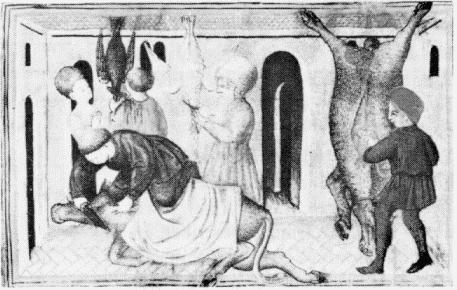
|
Shehitah (Heb.), the Jewish method of slaughtering [of] permitted animals or birds for food. Spotlessly clean sharp knife is drawn quickly and uninterruptedly across throat, severing windpipe, esophagus, jugular veins, and carotid arteries, causing immediate unconsciousness and death. Slaughterer (shohet) required to be of impeccable character and has to be authorized by rabbi who examines him.
Geoffrey Wigoder (editor), Encyclopedic Dictionary of Judaica, Leon Amiel Publisher, New York-Paris, 1974, p. 548. |

Decision by European Parliament could raise cost of kosher food The European Parliament has backed a move that, if implemented, could send the cost of kosher meat in Britain skyrocketing. Members of the European Parliament, the legislative branch of the European Community, declared that consumers must be told if they are buying meat produced by religious slaughter. But despite the politician's vote, an official at the European Commission, the E.C.'s administrative body, said the proposal was unlikely to become European law. David Massel, executive director at the Board of Deputies of British Jews, described the vote as an "unwelcome development." The proposed labeling of religiously slaughtered meat "stigmatizes shechitah as something which is cruel," he said, using the Hebrew word for ritual slaughter. "The Ministry of Agriculture has rejected such a move in Britain, and we hope that view will prevail." Dayan Berel Berkovits of the Federation of Synagogues Beth Din said he was "extremely perturbed." Labeling implies shechitah is less humane than other slaughter methods, he said, and there would be serious economic repercussions for the kosher trade. The back parts of animals killed by shechitah are currently sold to the non-Jewish market because they are not kosher. But if shops were to start turning down labeled meat, the cost would have to be passed on to the kosher consumer. "If the man in the street reads a label saying that the meat has been produced by ritual slaughter, his automatic reaction would be there is something wrong with it, therefore it should be avoided," Berkovits said. "The hindquarters, which are now sold to the general market, would no longer be acceptable, and therefore the price of kosher meat would double or treble." The proposal, put forward by David Morris, a British member of the European Parliament, still must be approved by the E.C. Council of Ministers. But since Britain, which is opposed to the labeling, holds the presidency of the council, there are strong hopes here it will ultimately be rejected. But Berkovits warned that until the right to shechitah is guaranteed in European law, "there will always be a danger of amendments to interfere with or ban it." The Midwest Jewish Week, 17Jul92, p. 4. |